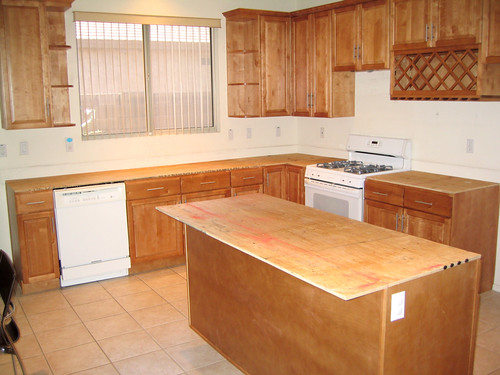
Buddhism is about respect -- respect for oneself, respect for one's neighbors, respect for one's enemies, respect for all animals, even respect for your kitchen cabinets. You might be thinking, "I was with you through the animals, but my cabinets!?" Yes, that's right, even your cabinets deserve your respect.
In a way, I'm using respect as a mental trick. In Buddhism we tend to talk about mindfulness, compassion, wisdom, concentration, and generosity. While I think it's obvious that respect is a positive trait, and belongs in the above group, it shows itself infrequently in Buddhist sutras. But if we take a good look at respect, we can see that it really represents an effective means to practice, particularly when applied to kitchen cabinets.
When I open my cabinet to get a glass, I can pull the cabinet open, grab my glass, and let the cabinet door slam back against the cabinet itself. Or I can open the cabinet door, remove my glass, and let the door go a few inches from the casing as I turn my attention to my next task--filling my glass. Or I can close the cabinet door carefully, holding it all the way until I gently bring it back into contact with the cabinet. Here is where respect appears. If I respect the cabinet, how will I close it? Will I allow it to slam noisily? Or will I give it the attention it deserves until closure?
Here, again, you might be thinking, "But the cabinet isn't sentient. How can I respect a cabinet? That's nonsensical!" I agree, it is nonsensical. There's really nothing a cabinet can do to earn your respect. And that's the very reason why you should respect it! It teaches you that all things deserve respect, even those things that haven't earned it. So when somebody who really annoys you enters your conversation at a dinner party, your practice of respect will bear fruit, and you will find that you respect that person despite your differences.
There's another benefit to showing respect toward your cabinets. If you respect your cabinets, you will do nothing to harm them purposefully. You will be gentle with them, maybe even loving, and this becomes a lesson in nonviolence and nonharming. Furthermore, to avoid harming your cabinets, you will close them gently, paying attention the entire time. This is a practice in mindfulness. This practice is so effective because you have immediate feedback: sound. When you slam your cabinet doors, you are immediately reminded of your transgression.
So we have come full circle. We began by observing that Buddhism centers around respect for all beings. We then chose to extend this to non-sentient objects. By doing so, we obtained the wonderful side effect of the practice of mindfulness and nonviolence. In this way, we never have to ask, "Am I going to be able to carry this practice off the cushion into everyday life?" because the practice began in the midst of everyday life! So the next time somebody asks you what you get from your Buddhist practice, you can answer with a straight face, "I respect my kitchen cabinets."




4 comments:
Awesome! I am definitely looking at my cabinets in a whole new light now. (I wish we could fix them... they're coming apart because they're made of particle board...)
Here's an idea as to why the cabinets might be worthy of respect: if they're wood, they're made of living trees sacrificed to hold your glassware. If they're plastic, then their production involved the use of hazardous and toxic materials that probably harmed the environment, making that a sacrifice as well. If they're made of metal, then the mining techniques used to gather the material may have sacrificed part of the landscape. Respect them and use them gently, because they are part of the world that has been given up for your convenience.
Hi Jeff,
Thanks for the Druidic insight into my example! Your view is another great way to develop respect for all other things, seeing their interconnectedness, how we truly rely on these things. Thank you for the comment.
I had to laugh because one of the last discussions I had with my former roommate was about the cabinets about this very subject.
I had told him to respect the cabinets because they were there to give people many years of use. How can you expect them to hold up over the years if you don't respect them? It is good to be gentle with them. He had let them slam shut so many times that they were coming off the hinges. (I also had similar conversations with him about my furniture, dishes, etc. LOL He just didn't seem to get it.)
You're right - it is about being mindful about your surrounding and how you impact those surroundings. Everything we do has a consequence, whether "good" or "bad."
Exactly Sojourner! Not to mention that it's just really annoying when you hear the nice cabinets slamming in the other room. :)
Post a Comment